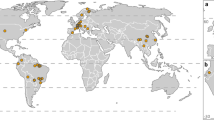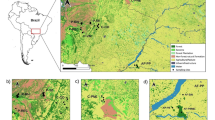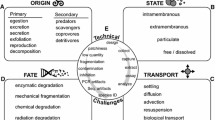Abstract
The microbiome is an important consideration for the conservation of endangered species. Studies provided evidence of the effect of behavior and habitat change on the microbiota of wild animals and reported various inferences. It indicates the complexity of factors influencing microbiota diversity, including incomplete sampling procedures. Data abnormality may arise due to the procedures warranting preliminary analysis, such as rarefaction, before downstream analysis. This present study demonstrated the effect of data rarefaction and aggregation on the comparison of wild rusa deer’s gut microbial diversity. Eighty-five feces samples were collected from 11 deer populations inhabiting three national parks in Java and Bali islands. Using the Illumina Nova-Seq platform, fragments of 16s rRNA gene were sequenced, and raw data of 51,389 reads corresponding to 2 domains, 22 phyla, 45 classes, 83 orders, 182 families, and 460 genera of bacteria were obtained. Data rarefaction was applied at two different library sizes (minimum and fixed) and aggregation (11 populations into 3 research sites) to investigate its effect on the microbial diversity comparison. There are significant differences in alpha diversity between populations, but not research sites, at all library sizes of rarefaction. A similar finding is also found in beta diversity. Moreover, data rarefaction and aggregation result in different values of the diversity metrics. This present study shows that statistical analysis remains a substantial concern in microbiome studies applied to conservation biology. It suggests reporting a more detailed data normalization in microbiome studies as an inherent control of suboptimal sampling, particularly when involving feces.





Similar content being viewed by others
Data availability
The datasets generated during and/or analyzed during the current study are available from the corresponding author upon reasonable request.
References
Aitchison J (1982) The statistical analysis of compositional data. J R Statist Soc B 44(2):139–177. https://doi.org/10.1111/j.2517-6161.1982.tb01195.x
Alberdi A, Martin Bideguren G, Aizpurua O (2021) Diversity and compositional changes in the gut microbiota of wild and captive vertebrates: a meta-analysis. Sci Rep 11:22660. https://doi.org/10.1038/s41598-021-02015-6
Amato KR, Yeoman CJ, Kent A, Righini N, Carbonero F, Estrada A, Rex Gaskins H, Stumpf RM, Yildirim S, Torralba M, Gillis M, Wilson BA, Nelson KE, White BA, Leigh SR (2013) Habitat degradation impacts black howler monkey (Alouatta pigra) gastrointestinal microbiomes. ISME J 7:1344–1353. https://doi.org/10.1038/ismej.2013.16
André A, Mouton A, Millien V, Michaux J (2017) Liver microbiome of Peromyscus leucopus, a key reservoir host species for emerging infectious diseases in North America. Infect Genet Evol 52:10–18
Bahrndorff S, Alemu T, Alemneh T, Lund Nielsen J (2016) The microbiome of animals: implications for conservation biology. Int J Genomics 2016:1–7. https://doi.org/10.1155/2016/5304028
Barelli C, Albanese D, Donati C, Pindo M, Dallago C, Rovero F, Cavalieri D, Michael TK, Christine HH, De Filippo C (2015) Habitat fragmentation is associated to gut microbiota diversity of an endangered primate: implications for conservation. Sci Rep 5:14862. https://doi.org/10.1038/srep14862
Borbón-García A, Reyes A, Vives-Flórez M, Caballero S (2017) Captivity shapes the gut microbiota of Andean bears: insights into health surveillance. Front Microbiol 8:1316. https://doi.org/10.3389/fmicb.2017.01316
Cando-Dumancela C, Liddicoat C, McLeod D, Young JM, Breed MF (2021) A guide to minimize contamination issues in microbiome restoration studies. Restor Ecol 29:e13358. https://doi.org/10.1111/rec.13358
Chong J, Liu P, Zhou G, Xia J (2020) Using MicrobiomeAnalyst for comprehensive statistical, functional, and meta-analysis of microbiome data. Nat Protoc 15:799–821. https://doi.org/10.1038/s41596-019-0264-1
DeJong TM (1975) A comparison of three diversity indices based on their components of richness and evenness. Source. Oikos 26:222–227
Edgar R (2010) Usearch. https://www.osti.gov/servlets/purl/1137186.
Gibson KM, Nguyen BN, Neumann LM, Miller M, Buss P, Daniels S, Ahn MJ, Crandall KA, Pukazhenthi B (2019) Gut microbiome differences between wild and captive black rhinoceros – implications for rhino health. Sci Rep 9:7570. https://doi.org/10.1038/s41598-019-43875-3
Goossens B, Salgado-lynn M (2013) Advances and difficulties of molecular tools for carnivore conservation in the tropics. Raffles Bull Zool 28:43–53
Guo W, Mishra S, Wang C, Zhang H, Ning R, Kong F, Zeng B, Zhao J, Li Y (2019) Comparative study of gut microbiota in wild and captive giant pandas (Ailuropoda melanoleuca). Genes 10(10):827. https://doi.org/10.3390/genes10100827
Hannon GJ (2010) FASTX-Toolkit. http://hannonlab.cshl.edu/fastx_toolkit.
Hong J, Karaoz U, De Valpine P, Fithian W (2022) To rarefy or not to rarefy: robustness and efficiency trade-offs of rarefying microbiome data. Bioinformatics 38:2389–2396. https://doi.org/10.1093/bioinformatics/btac127
Hughes JB, Hellmann JJ (2005) The application of rarefaction techniques to molecular inventories of microbial diversity. Methods Enzymol 397:292–308
Iman MH, Kuswandi PC, Subrata SA (2024) Genetic variation of the native Rusa deer (Rusa timorensis) in Java and Bali (Indonesia) as revealed using non-invasive sampling. Biodiversitas 25(1):355–360. https://doi.org/10.13057/biodiv/d250241
Klindworth A, Pruesse E, Schweer T, Peplies J, Quast C, Horn M, Glöckner FO (2013) Evaluation of general 16S ribosomal RNA gene PCR primers for classical and next-generation sequencing-based diversity studies. Nucleic Acids Res 41(1):e1–e1. https://doi.org/10.1093/nar/gks808
Lin H, Das PS (2020) Analysis of microbial compositions: a review of normalization and differential abundance analysis. NPJ Biofilms Microbiomes 6(1):60. https://doi.org/10.1038/s41522-020-00160-w
Liu T, Zhao H, Wang T (2020) An empirical Bayes approach to normalization and differential abundance testing for microbiome data. BMC Bioinformatics 21:225. https://doi.org/10.1186/s12859-020-03552-z
Mahé F, Czech L, Stamatakis A, Quince C, de Vargas C, Dunthorn M, Rognes T (2021) Swarm v3: towards tera-scale amplicon clustering. Bioinformatics 38(1):267–269. https://doi.org/10.1093/bioinformatics/btab493
McKnight DT, Huerlimann R, Bower DS, Schwarzkopf L, Alford RA, Zenger KR (2019) Methods for normalizing microbiome data: an ecological perspective. Methods Ecol Evol 10:389–400. https://doi.org/10.1111/2041-210X.13115
Murray MH, Lankau EW, Kidd AD, Welch CN, Ellison T, Adams HC, Lipp EK, Hernandez SM (2020) Gut microbiome shifts with urbanization and potentially facilitates a zoonotic pathogen in a wading bird. PLoS One 15(3):e0220926. https://doi.org/10.1371/journal.pone.0220926
Pan AY (2021) Statistical analysis of microbiome data: the challenge of sparsity. Curr Opin Endocr Metab Res 19:35–40. https://doi.org/10.1016/j.coemr.2021.05.005
Paulson JN, Colin Stine O, Bravo HC, Pop M (2013) Differential abundance analysis for microbial marker-gene surveys. Nat Methods 10:1200–1202. https://doi.org/10.1038/nmeth.2658
Prabhu VR, Wasimuddin VR, Kamalakkannan R, Arjun MS, Nagarajan M (2020) Consequences of domestication on gut microbiome: a comparative study between wild Gaur and domestic Mithun. Front Microbiol 11:133. https://doi.org/10.3389/fmicb.2020.00133
Sun CH, Liu HY, Liu B, Yuan BD, Lu CH (2019) Analysis of the gut microbiome of wild and captive Père David’s deer. Front Microbiol 10:2331. https://doi.org/10.3389/fmicb.2019.02331
Sun Y, Sun Y, Shi Z, Liu Z, Zhao C, Lu T, Gao H, Zhu F, Chen R, Zhang J, Pan R, Li B, Teng L, Guo S (2020) Gut microbiota of wild and captive Alpine musk deer (Moschus chrysogaster). Front Microbiol 10:3156. https://doi.org/10.3389/fmicb.2019.03156
Sutomo, van Etten E (2021) Savanna plant communities in the wetter parts of the Indonesian archipelago. Folia Geobot 56:193–204. https://doi.org/10.1007/s12224-021-09401-y
Tang L, Li Y, Srivathsan A, Gao Y, Li K, Hu D, Zhang D (2020) Gut microbiomes of endangered Przewalski’s horse populations in short- and long-term captivity: implication for species reintroduction based on the soft-release strategy. Front Microbiol 11:363. https://doi.org/10.3389/fmicb.2020.00363
Trevelline BK, Fontaine SS, Hartup BK, Kohl KD (2019) Conservation biology needs a microbial renaissance: a call for the consideration of host-associated microbiota in wildlife management practices. Proc R Soc B 286(1895):20182448. https://doi.org/10.1098/rspb.2018.2448
Tsilimigras MCB, Fodor AA (2016) Compositional data analysis of the microbiome: fundamentals, tools, and challenges. Ann Epidemiol 26:330–335. https://doi.org/10.1016/j.annepidem.2016.03.002
Wang Q, Garrity GM, Tiedje JM, Cole JR (2007) Naive Bayesian classifier for rapid assignment of rRNA sequences into the new bacterial taxonomy. Appl Environ Microbiol 73(16):5261–5267. https://doi.org/10.1128/AEM.00062-07
Wei F, Wu Q, Hu Y, Huang G, Nie Y, Yan L (2019) Conservation metagenomics: a new branch of conservation biology. Sci China Life Sci 62:168–178. https://doi.org/10.1007/s11427-018-9423-3
Weiss S, Xu ZZ, Peddada S, Amir A, Bittinger K, Gonzalez A, Lozupone C, Zaneveld JR, Vázquez-Baeza Y, Birmingham A, Hyde ER, Knight R (2017) Normalization and microbial differential abundance strategies depend upon data characteristics. Microbiome 5:1–18. https://doi.org/10.1186/s40168-017-0237-y
West AG, Waite DW, Deines P, Bourne DG, Digby A, McKenzie VJ, Taylor MW (2019) The microbiome in threatened species conservation. Biol Conserv 229:85–98. https://doi.org/10.1016/j.biocon.2018.11.016
Whitten T, Soeriaatmaja RE, Afiff SA (1996) The ecology of Java and Bali. Periplus Edition, Hong Kong
Willis AD (2019) Rarefaction, alpha diversity, and statistics. Front Microbiol 10:2407. https://doi.org/10.3389/fmicb.2019.02407
Xia Y, Sun J, Chen D-G (2018) Statistical analysis of microbiome data with R. Springer Singapore, Singapore
Yang H, Leng X, Du H, Luo J, Wu J, Wei Q (2020) Adjusting the prerelease gut microbial community by diet training to improve the postrelease fitness of captive-bred Acipenser dabryanus. Front Microbiol 11:488. https://doi.org/10.3389/fmicb.2020.00488
Zemanova MA (2019) Poor implementation of non-invasive sampling in wildlife genetics studies. Rethinking Ecol 4:119–132. https://doi.org/10.3897/rethinkingecology.4.32751
Zhu L, Wang J, Bahrndorff S (2021) Editorial: The wildlife gut microbiome and its implication for conservation biology. Front Microbiol 12:10–13. https://doi.org/10.3389/fmicb.2021.697499
Acknowledgements
The authors are grateful to the Directorate General of Higher Education, Research, and Technology–the Ministry of Education, Culture, Research, and Technology of the Republic of Indonesia for funding this research. The authors also thank the French Ministry of Foreign Affairs and International Development (MAEDI) and the French Ministry of Higher Education and Research (MESR) for supporting this research collaboration. The authors also acknowledge the Directorate General of Nature and Ecosystem Conservation–Ministry of Environment and Forestry of the Republic of Indonesia for issuing a sample collection permit.
Funding
Authors SAS, PY, and WTA received funding from the Directorate General of Higher Education, Research, and Technology, Indonesia, and authors MdGW, AA, and JM had support from the French Ministry of Foreign Affairs and International Development and the French Ministry of Higher Education and Research.
Author information
Authors and Affiliations
Contributions
All authors contributed to the research conception and design. Sample preparation, data collection and analysis were performed by SS and AA. The first draft of the manuscript was written by SS and AA, and all authors commented on previous versions of the manuscript. All authors read and approved the final manuscript.
Corresponding author
Ethics declarations
Ethics approval
The authors affirm that no human research participants are involved in this research, and all fecal samples were collected non-invasively. Therefore, the research ethics committee of Universitas Gadjah Mada confirmed that ethical approval is not required.
Competing interests
The authors declare no competing interests.
Additional information
Publisher’s Note
Springer Nature remains neutral with regard to jurisdictional claims in published maps and institutional affiliations.
Rights and permissions
Springer Nature or its licensor (e.g. a society or other partner) holds exclusive rights to this article under a publishing agreement with the author(s) or other rightsholder(s); author self-archiving of the accepted manuscript version of this article is solely governed by the terms of such publishing agreement and applicable law.
About this article
Cite this article
Subrata, S.A., Yuda, P., Artama, W.T. et al. Rusa deer microbiota: the importance of preliminary data analysis for meaningful diversity comparisons. Int Microbiol (2024). https://doi.org/10.1007/s10123-024-00521-x
Received:
Revised:
Accepted:
Published:
DOI: https://doi.org/10.1007/s10123-024-00521-x




